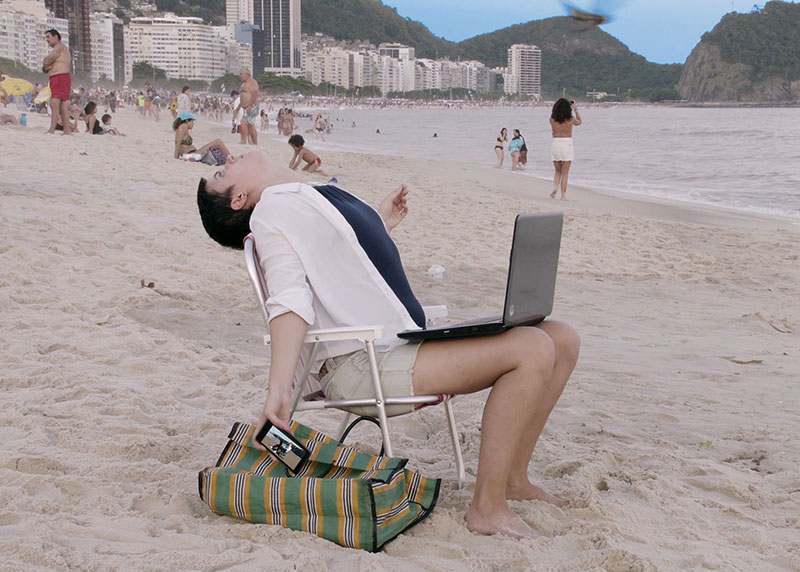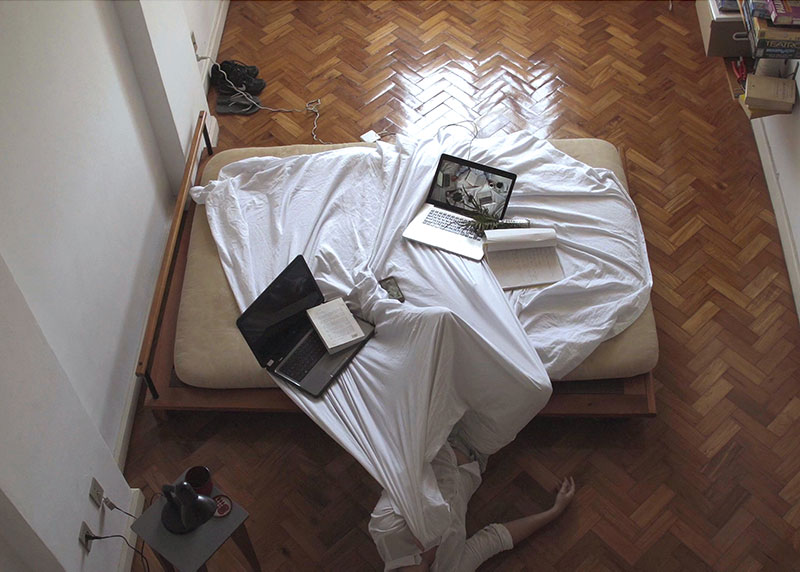BIOGRAPHY
Sofia Caesar (1989) is an artist from Rio de Janeiro, Brazil, currently based in Brussels.
Rooted in dance practices and somatic therapies, Caesar’s work evokes physical states between activity and passivity, labour and rest, movement and pause. Working mainly with video, she uses dance and somatics to propose relations between the body and the technological devices of daily life. Acknowledging the intimate effects of technology on our bodies and minds, as well as the physical demands of productivity, her installations often summon stillness, slowness, and repose. Her practice spans the relationship between the Latin American avant-gardes, the role of the contemporary artist, and the aesthetics of leisure as appropriated by international tech corporations.
In the past years Caesar has shown work and collaborated with institutions such as the Transmediale (DE), Bienal Sur, Moscow Biennial (RUS), M HKA (BE), SFMOMA (USA), A Tale of a Tub (NL), Tomie Ohtake Institute (BR), ISELP (BE), Contour Biennial (BE), Beursschouwburg (BE), CAVEAT/Jubilee (BE) amongst other organisations in Belgium and the world. In 2018 Caesar was honoured the Prize Rumos Itaú Cultural (BR) and a full grant to pursue her PhD and teach at Luca School of Arts in Brussels (BE). Sofia is represented by Cavalo Gallery (Rio de Janeiro, BR)
Sofia Caesar works are present in public and private collections such as FRAC Pays de la Loire, Parco d’Arte Vivente (IT), Jacques De La Beraudiere, MAC – Museum of Contemporary Art of Niteroi (BR), Itaú Cultural (BR), and others.
WORK ON DISPLAY
Workation, 2019
Installation: video loop 4 channels, stereo sound, screens, laptop, smartphone, carpet, seat, various dimensions.
This work explores gesture and spatial forms implied by the term workation, an English neologism combining “work” and “vacation”. While working on holiday sounds oxymoronic, a quick search through Google images reveals a new landscape of production: middle-class women and men comfortably lying on white sand and crystal water beaches as they work at their computer while sipping an iced cocktail. New IT technologies potentially allow us to perform any office task from anywhere in the world, provided there is a fast internet connection.
During the pandemic in 2020 and in light of the acceleration of remote work, workation became the dream of many. Caesar’s work, carried out in 2019, invites the audience to reflect upon various points, including the transformation of our posture and gestures as a consequence of the body’s different approach to certain types of work in the service sector.
However, it is also a reflection on how we are going to inhabit urban environments in the future: should workation extend to every type of job that does not require the production of material goods or services, and for which a corporeal presence is necessary? Would we witness the advent of cities exclusively inhabited by working classes and tourists? Would their counterparts be natural paradises invaded by remote workers? This thought exercise leads us to consider how much the transformation of intangible work’s production could strongly affect, in a tangible way, our ways of inhabiting spaces, often on a scale of which we are not immediately conscious.


